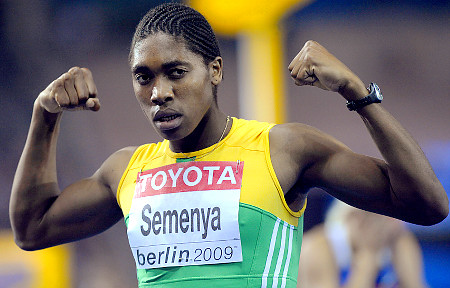
What is gender? Apparently, as the case of South African
runner Caster Semenya is proving, it’s less absolute than penis versus
vagina. As controversy swirls over
whether the gold-medal-winning 18-year-old is wholly female, I wondered, should
it even matter?
Assuming this isn’t a cynical ploy on the part of the South
Africans to win at all costs (and if you read this
article, you’ll see Caster’s childhood friends will defend her gender
identity to the bitter end), the issues raised would seem to be legitimately,
and, er, organically developing through nobody’s fault. The humiliation and scandal for Miss
Semenya, who never asked for this, must be brutal. Her countrymen, certainly, are outraged and many consider
the entire issue to be racially, not sexually, motivated.
But there’s an ethical question here about which people seem
to be presuming there’s an obvious answer. Namely, if Caster Semenya is found to be intersexed, should she be banned from competition as a
woman? Everyone seems to think
the answer is a given – naturally, yes, she must be banned. I say, let’s give it a couple minutes
of examination before we rush to a conclusion.
Dilemma:
Banning Caster would be grossly unfair to her, but perhaps only fair to women’s teams.
Argument:
For Semenya, it’s not as if she can be reassigned to an intersex team, so it would be, effectively, ending her career – a career that’s given an unknown South African athlete a chance to shine on the international stage, perhaps take her immense talent all the way to the Olympics.
On the other hand, if she’s got secondary male characteristics, her increased strength is an advantage with which the women on the track team cannot hope to compete (right?). They’d be at a disadvantage against her.
On the other, other hand, one could argue that all Olympic-caliber athletes are genetic prodigies. Perhaps what we’re tending to look at as a mutation or malformation is just another gift, like Michael Phelps’ enormous arm span or Ian Thorpe’s colossal feet. We don’t know quite what makes Usain Bolt so fast (though he is much taller than the average sprinter), but though we test and test him for performance enhancing drugs, all we can say is, man, that dude is fast. No one is forcing these fellows out of competition for having a natural advantage.
So what I’m asking is, when does leveling the playing field go too far? What’s a natural advantage, a gift from the genetic lottery (or God, depending on what you believe), and what’s unacceptable to the mainstream?
If Caster Semenya has, indeed, been given the ambiguous gift/curse of ambiguous gender, life will be hard enough for her. It seems a terrible shame to reduce yet further the opportunities available to her by denying her the right to compete.
What do you think? Are those the breaks, or should we give her a break?
Subscribe to receive updates from Everyday Ethics or follow us on Twitter!

